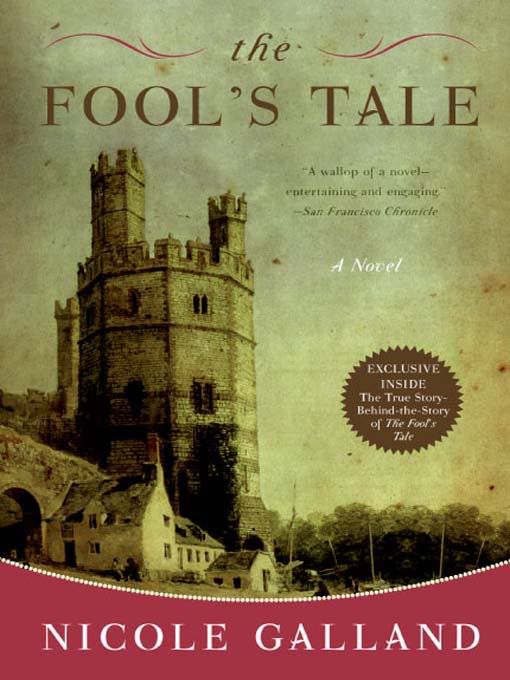
Apparently Nicole Galland is "an award-winning screenwriter" so I'm assuming she writes her screenplays under a pseudonym because I've looked for her everywhere.
Anyway, The Fool's Tale is her first novel; I picked it up on Martha's Vineyard, where she's a native, a couple years ago when I was feeling bored. I didn't expect to be impressed with it.
...and then I stayed up until three in the morning to finish the damn thing. It's a hefty size, too, an intimidating 500+ page book with small font. The writing manages to be descriptive and a bit lengthy, but still exciting. Galland stresses in an afterward that while some characters and events are based in history, she has taken many liberties with people and places and that this is not a historically accurate novel.
The story revolves around a small Welsh kingdom in the 1100's and the deadly politics involved in keeping it afloat. Maelgwyn ap Cadwallon, nicknamed Noble, is the king of the small but relatively secure Maelienydd. His best friend is an orphan named Gwirion, who was raised beside him and has a quick wit and endless nose for trouble. Gwirion is the court's fool and harpist, and gets away with murder because the king will never punish him; Gwirion's pranks and tomfoolery make him the court's darling, and the king confides his darkest secrets in Gwirion, who saved the king's life when they were children.
Then, in an attempt to secure one of his borders, Noble marries Isabel Mortimer. Isabel proves to be intelligent, cold, and uninterested in a Welsh lifestyle, a lifestyle she considers to be distatseful and primitive. Thus ensues the tortorous relationship Isabel shares with her new husband; sometimes they are able to get along, and she enjoys his sexual attentions; however he does not love her, she does not love him, and they often argue about her status or his various affairs. Isabel and Gwirion also abhor each other, and compete for the king's attention. Isabel doesn't feel any more at home after the king makes it quite clear that Isabel will never be as important as Gwirion, the fool, is.
Slowly, a change comes about as Isabel and Gwirion make a truce after months of discord. Isabel begins to embrace the Welsh lifestyle, and grudgingly earns the admiration and love of her people. However, she is unable to produce a child, and after a poisoning causes her to miscarry her first child, she is afraid she is barren. As her uncle continually betrays Noble, Noble begins to find that his marriage to Isabel was useless. As Isabel is becoming accustomed to her life as Queen, Noble faces increasing problems with his kingdom; the English on one border continually pose a threat, and another Welsh lord by the name of Llewelyn is a rising star in Wales. We are treated to some devious political thinking and machinations. While Isabel is coming out of her shell, Noble is sinking deeper and deeper into a twisted immorality which he justifies with his charge of preservation of his kingdom.
Thus it is that, when Noble is away fighting a war, Llewelyn's men come to claim the castle, and Gwirion and Isabel are locked up together. They realize that after months of fighting, they are no longer enemies--they have a deep bond in that both are dependent on the king's whim, and are utterly powerless. For Isabel, the law and society bind her to Noble; Gwirion knows that if he tried to leave Noble, he would be hunted to the ends of the earth. When Gwirion finally sees Isabel without her wimple, or head covering, he's shocked at how beautiful she is. Their illicit affair, one of not just lust but of true intimacy, something neither has known, begins.
Galland weaves these three characters so tightly together, and creates the most awkward and horrifying experiences and close calls for two lovers trying to hide their affair, that the circumstances are literally squirm-worthy. Despite the dense text, each page is suspense-ridden as we race towards an unknown conclusion. The affair itself comes with a wealth of complications; while Gwirion and Isabel love each other truly and deeply, their obligations to Noble, who is sinking further and further into depression as he watches his kingdom fall, leave them guilt-ridden. Gwirion being loved for himself, truly himself, brings about his maturation as he gropes for the one thing Noble's never given him- dignity. Noble has never allowed Gwirion to fall in love, because Noble will not allow a woman to come between them. Noble himself is half-insane by the end of the novel, revealing that he only allowed the affair to continue because he wanted to observe two of the most honest people he knows trying to be dishonest.
The ending of the novel is shocking, but I won't reveal more than that. Noble is truly a beastly creation, yet he deserves some sympathy for his inability to love romantically, and for his ability to love his one true friend only in a demented way. No one is blameless at the novel's close, and yet each character is profoundly understandable, sympathetic, and full of surprises. That is the true triumph of Galland's novel; how intewoven the fates' of these three fully-fleshed characters are, and the powerful things she chooses to do with them.
-elln

No comments:
Post a Comment